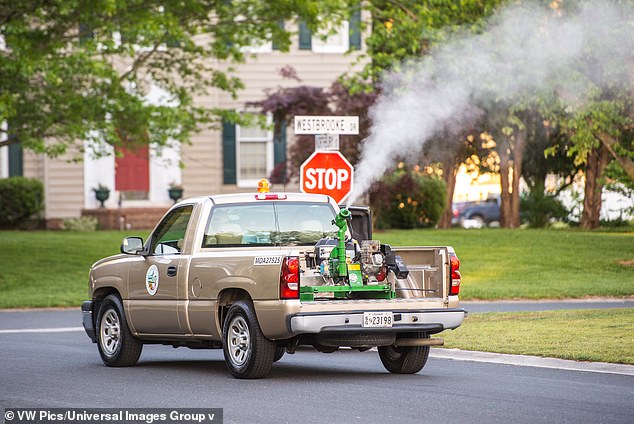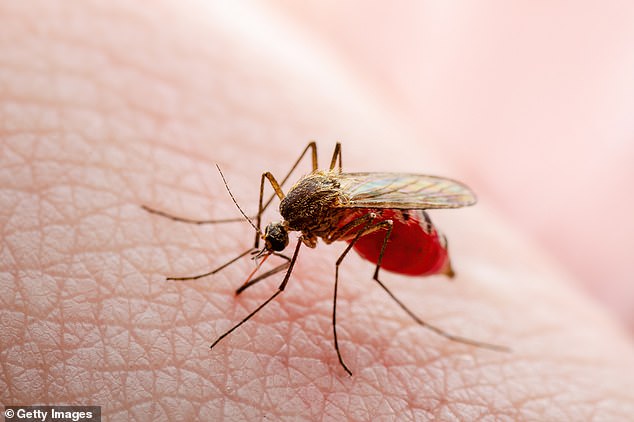Cities across US make rare attempt to spray chemicals on streets in response to onslaught of deadly mosquito-borne infections
American cities are spraying chemicals on their streets in response to a rise in several deadly mosquito-borne diseases, an unprecedented measure.
Massachusetts, New York, Texas and California are among the states using pesticides to ward off the increasingly disease-ridden insects.
The decision comes after a surge in mosquito-borne illnesses in the U.S., including West Nile virus, which hospitalized White House Covid doctor Anthony Fauci this month, “Triple E,” a brain disease that has killed two Americans so far this year, and “sloth fever,” a disease transmitted by sloths to mosquitoes.
Officials are spraying on streets at night, when people are less likely to be outside, to reduce residents’ exposure to the chemicals, which can be harmful to inhale or ingest. The doses will also be “ultra-low volume.”
Other areas have also taken drastic measures, including imposing curfews to limit people’s exposure to mosquito bites.
Public health officials will spray pesticides near these four cities to help curb the spread of deadly mosquito-borne diseases.
Several Americans have died from mosquito-borne diseases this year, including a New Hampshire man who died from EEE earlier this month, the first human case in the state in 10 years.
In Massachusetts, towns in southern Worcester County and Plymouth County took an aggressive approach to combating mosquito-borne diseases this month after an 80-year-old Worcester County man contracted EEE — the first human case in the state since 2020.
EEE is a rare but serious virus that spreads to humans through infected mosquito bites. It causes swelling in the brain and about 30 percent of infected people do not survive.
To help stop the spread of the virus, the Massachusetts Department of Public Health will begin spraying the pesticide Anvil 10+10 from trucks and planes at night, starting shortly after sunset and ending in the early morning.
In addition to spraying pesticides, authorities in Oxford, Massachusetts, have imposed a voluntary curfew, urging residents to stay indoors after 6 p.m. to avoid mosquito bites.
And in Plymouth, Massachusetts, authorities have ordered parks closed from dusk to dawn, when mosquitoes are most active.
Meanwhile, New York City, Arlington and San Jose will have to deal with another disease: West Nile virus. WNV is the leading cause of mosquito-borne disease in the continental U.S.
In most cases, the virus causes no symptoms or mild flu-like symptoms. But about one in 150 cases becomes serious and life-threatening, with swelling of the brain, the membranes around the brain, or the spinal cord.

Cities will use trucks and planes to spray mosquito-killing pesticides in areas at high risk of disease.
There have been six serious cases of West Nile virus in New York City this year. None have been fatal, but the city has started spraying pesticides in parts of Manhattan and Brooklyn to reduce the risk.
The city’s Public Health Department sprays the pesticides Anvil 10+10, Duet or MERUS 3 with trucks at night.
Texas has reported 37 cases of West Nile virus in 2024 — more than any other U.S. state. One of those cases was fatal.
Recently, three mosquitoes in the city of Arlington tested positive for the virus, prompting city officials to begin spraying pesticides at night in certain locations.
In certain areas of Arlington, contractors are spraying a pesticide called Aqua-Reslin, which kills adult mosquitoes.
In Santa Clara County, California, one resident died earlier this month from West Nile virus and another was hospitalized. West Nile-positive mosquitoes have also been detected in the San Jose area.
The pesticides used for this treatment are Zenivex E4 and Merus 3.0. Both are very effective against mosquitoes.

Rising global temperatures are fueling an increase in mosquito-borne diseases in the US.
In all four of these cities, pesticides are sprayed at an ‘ultra-low rate’, which means that there is no significant health risk to the residents and that no one has to move during the treatment.
Officials are also scheduling spraying at night, when people are outside less often, to limit residents’ exposure to these chemicals.
Some data suggest the risk of mosquito-borne diseases is increasing in the US as rising global temperatures cause infected mosquitoes to expand their range.
According to Vector Disease Control International, the number of dengue fever cases in the US increased by more than 800 percent between 2021 and 2022.
In most cases, mosquito-borne diseases are not fatal. However, they can make an infected person very sick.
As mosquito-borne diseases increase in the U.S., cities may need to spray pesticides more often.
There are things you can do to protect yourself from mosquito bites and reduce your risk of disease.
The Center for Disease Control (CDC) recommends wearing loose clothing that covers your skin, applying insect repellent, and installing screens on windows and doors to keep insects from entering.
